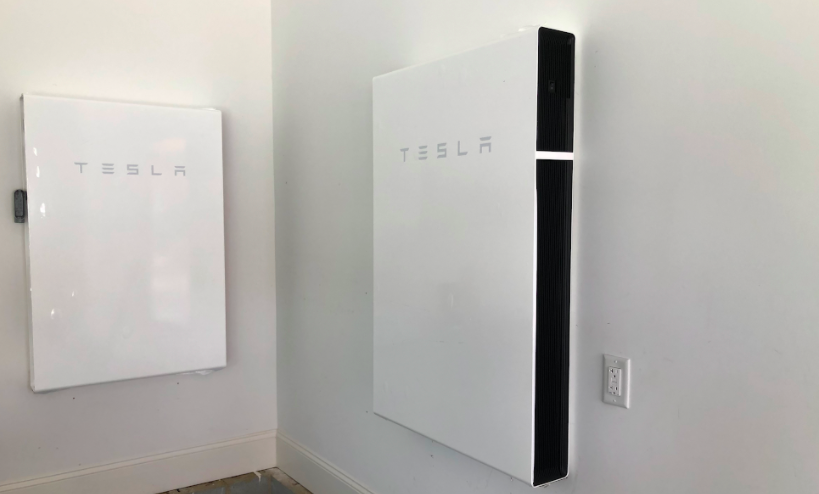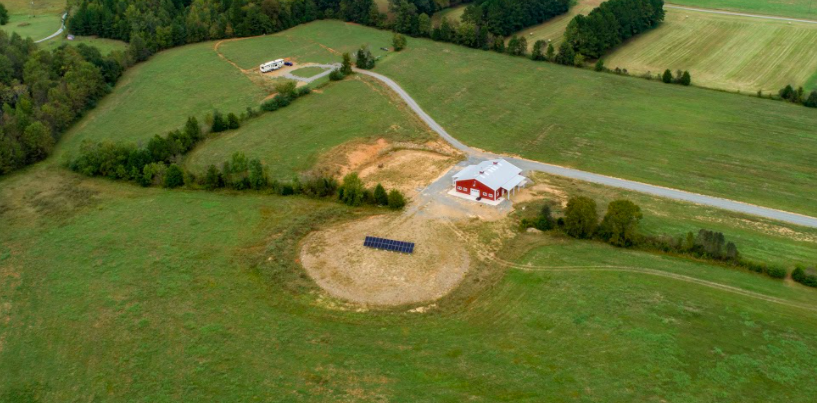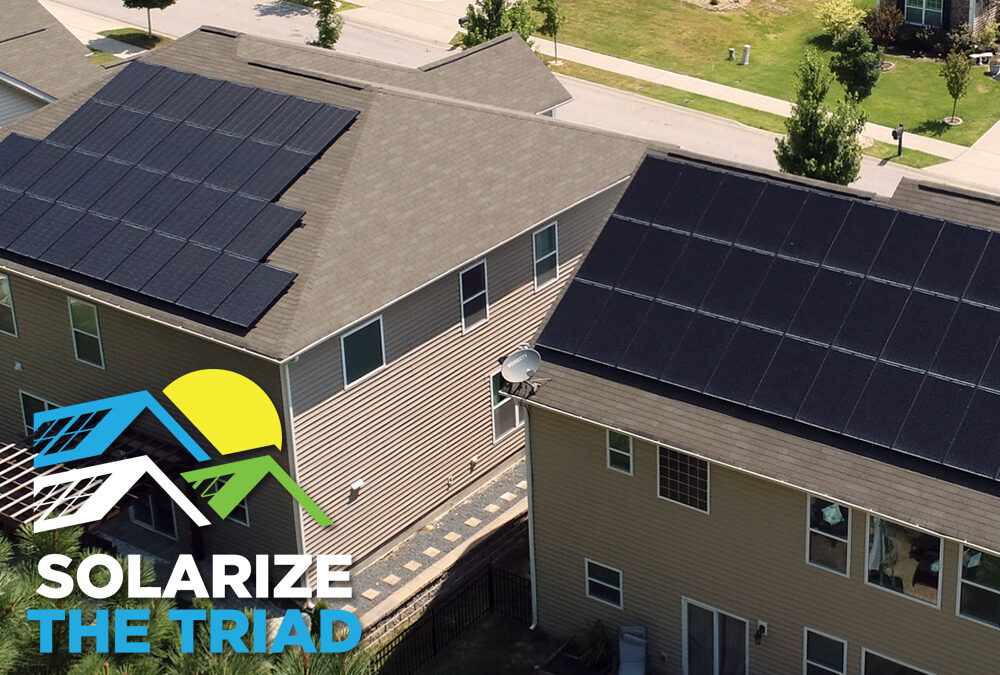
by Renu Energy | Nov 13, 2024 | Renu Solar News, Residential, Uncategorized
By Ken Haldin | November 13, 2024
WINSTON-SALEM, NC — Solarize the Triad continues to reach new lower price tiers as the community-led campaign offers several public opportunities this month to learn more about how to cost-effectively “go solar” through the campaign.
Already 43 Triad property owners have decided to purchase new renewable energy systems for their homes through this one-of-a-kind regionwide community-based group-buying program.
Several free community events are scheduled in the coming weeks for Triad homeowners to learn more about how to cost-effectively “go solar” through the campaign, which is led by a coalition of Triad community organizations.
A special Open House event featuring the campaign’s first buyer of a solar energy system and battery storage will enable Triad homeowners to take a close look at this system and get details about the volume-purchasing opportunity. The property, located in Northwest Winston in Old Town, will be accessible on Saturday, Nov. 16, from 10 a.m.-1 p.m.
Those who attend can meet the selected installer for the campaign as well as learn how a solar power installation on their property can lower their monthly utility spending through using a resilient and reliable form of renewable energy.
To attend this info session for free RSVP here for more event details. Anyone who brings their electricity bill information can get a preliminary evaluation immediately.
Solarize the Triad’s 7th tier of eight price tiers for residential purchasers offers a range between $2.20-$2.35/watt, depending on the equipment selected. Residential systems totaling 458kW have been contracted via the program.
These homes’ installations, once completed, will avoid 1,013,903 lbs. of CO2 in the Triad region. That’s the equivalent of more than 1 million miles driven by an average gasoline-powered passenger vehicle or over 100 gasoline-powered passenger vehicles driven for one year.
Triad property owners have just under one month remaining – until Nov. 30 – to sign up for free in order to become eligible for the campaign’s group-purchasing discounts before time elapses.
Other open-to-the-public events to familiarize the public with the Solarize opportunity are scheduled this month, including:
- Third Act NC Climate Cafe from 11 a.m.-12:30 p.m., Tuesday, Nov. 12 at 304 South Elm St. in Greensboro.
- Lot 63 Coffee and Taproom from 9-11 a.m., Wednesday, Nov. 13 at 614 Main St. in Winston-Salem
- Piedmont Environmental Alliance’s Annual Party from 5:30-7 p.m., Thursday, Nov. 14 at Second Harvest Food Bank of Northwest North Carolina. Second Harvest is located at 3330 Shorefair Dr. NW, Winston-Salem.
- Corner Farmers Market from 8 a.m.-12p.m. on Saturday, Nov. 16, where a Solarize the Triad table will be situated. The market takes place at 2105 W Market St., Greensboro.
Already more than 280 Triad property owners have signed up to receive a free proposal. Those who choose to buy through the Solarize the Triad campaign receive a rebate based on the lowest-price tier reached. Duke Energy Carolinas is also offering rebates for customers participating in its PowerPair program. In addition, a federal tax credit of 30 percent for newly installed solar energy systems and batteries is available to those who qualify.
Solarize the Triad is currently encouraging enrollment in the campaign since its official launch in July. Those interested may go to SolarizetheTriad.com to learn more about the program and sign up to receive a free evaluation without obligation.
The coalition of individuals and organizations in The Triad region fostering Solarize the Triad are dedicated to increasing awareness of local solar energy benefits; providing practical education, community outreach and support; reducing costs through group purchasing;; and creating a path toward greater and speedier local solar adoption. For assistance transforming your yard into a beneficial habitat for birds, pollinators, and wildlife through native plants, please visit forsythaudubon.org and ncwildflower.org.
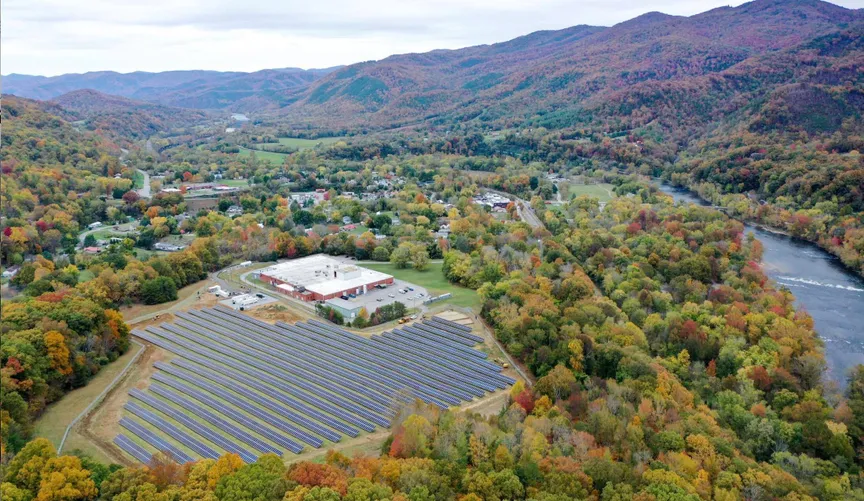
by Renu Energy | Oct 18, 2024 | Uncategorized
By Jeff St. John | 18 October 2024
Distributed solar and batteries are helping North Carolina communities that were cut off from grid power by flooding. Should utilities build them into resilience plans?
For years, Duke Energy has studied the threats that climate change poses to its power grid. It has produced tomes forecasting the risk to its power lines, substations, and power plants from fires, heat waves, and floods.
But the scope of Hurricane Helene’s devastation in the utility’s inland Carolinas territories — more than 350 substations disabled and a handful completely destroyed, and hundreds of thousands of people still without power a week after the floodwaters receded — has blown its risk forecasts out of the water.
Now, as tens of thousands of utility workers from across the country struggle to rebuild swaths of Duke’s grid from the ground up, energy experts warn that it and other utilities must start to consider alternatives to the century-old paradigm of utility poles, wires, and substations — like distributed power and microgrids.
Solar panels and batteries can power homes, businesses, churches, schools, and sometimes entire towns. These clean, distributed energy systems can reduce or replace the need for fossil-fueled backup generators during emergencies. They can also provide clean energy to the grid under normal conditions, helping to lower reliance on the fossil-fueled power plants responsible for climate change.
In parts of western North Carolina and South Carolina where floods swamped towns and knocked out highways, these technologies may be more cost-effective investments in climate resiliency than trying to harden traditional grid infrastructure against extreme weather.
Just how valuable distributed energy could be as an additional layer of protection against these threats is not yet clear, however. That’s largely because utilities and regulators haven’t fully baked those options into their existing methods of assessing climate change risks to their grids.
“It’s always hard right after these storms to talk about next steps, because all energy and time has to be spent on the emergency response,” said Jenny Brennan, a climate analyst at the nonprofit Southern Environmental Law Center. At the same time, it’s important to think ahead about “how to build for the next time a storm comes, so you’re more resilient as a community, and hopefully don’t have the same scale of destruction.”
In 2021 and 2022, Brennan was a member of a technical working group advising Duke on a climate resilience and adaptation study. That multiyear project assessed climate risks to a grid serving a roughly 56,000-square-mile service area in North Carolina and South Carolina. But that grid-focused report also touched on the idea of “supporting and encouraging local power options” such as microgrids, rooftop solar, and community solar.
Those distributed energy resources may be particularly well-suited for the mountainous, harder-to-reach parts of Duke Energy’s territory, Brennan said. “We’ve got to consider these different needs, and design an infrastructure that can be adaptive and address these problems.”
The utility-centric option: advanced microgrids
The more remote the town, the costlier it is to connect it to the grid — and to ensure that the connection remains intact. That’s why Duke Energy created a microgrid in Hot Springs, a town of about 535 residents just under 40 miles northwest of Asheville.
That project wasn’t cheap — Duke spent about $14.5 million to install 2 megawatts of solar power and 4.4 megawatt-hours of battery storage along with technology to control it as a grid resource. But according to the utility, that was cheaper than the grid upgrade required to provide the town with reliable power.
Hot Springs is connected to Duke’s larger grid by a single 10-mile power line that crosses mountainous and wooded terrain. The line is subject to frequent outages. Duke easily won regulatory approval in 2019 to build the cheaper microgrid instead of a second power line as a backup.
During Hurricane Helene’s aftermath, the microgrid was quickly restored and started providing power to Hot Springs’ downtown area after “the substation that fed the town was washed away by the floods,” Jason Handley, general manager of Duke’s Distributed Energy Group, wrote in a LinkedIn post. “Depending on solar output, we’ve also been able to bring on other load segments for periods of time.”
Duke is planning more microgrids at the Marine Corps Base Camp Lejeune in North Carolina and at a middle school that serves as a hurricane evacuation shelter in Florida. But at present, microgrids — or what Duke Energy calls “non-traditional solutions” — play only a minor role in the utility’s broader grid plans.
That’s largely because they are deemed cost-effective only for the most remote and vulnerable communities on its grid.
“If an energy storage system is the most cost-effective, feasible approach, Duke Energy will then pursue further development of the project,” the utility wrote in its climate resilience plan. Once such projects are identified, “the development cycle for these efforts is typically on the order of seven years.”
The basics for customers: rooftop solar and batteries
Tyler Norris, a Duke University doctoral fellow and former solar developer and special adviser at the Department of Energy, thinks that utilities like Duke Energy should look at more options than utility-managed microgrids.
“There needs to be an entire report dedicated to the role of distributed energy resources on a medium- and long-term solution set,” he said — including the kind of distributed energy that could have helped his elderly parents, whose home in Fairview, North Carolina, was without power for more than nine days after Hurricane Helene.
Norris spent a week with his parents, helping them manage without power or running water. “They have their own spring, but because we didn’t have power for the water pump, you have to haul water up the mountainside by hand,” he said. “I was trying to use a gas generator to charge our electric vehicle, which required jury-rigging it to the house ground.”
Rooftop solar systems can provide enough power to run a handful of household necessities — like a water pump — during daytime hours, he said. But most residential systems aren’t designed to keep power flowing during grid outages. Typically, these systems shut off when the grid goes down, a safety feature meant to prevent power from the solar panels from flowing back through downed utility lines and electrocuting utility workers doing repairs.
“It’s shocking how many of these existing behind-the-meter solar systems were not designed to provide any form of backup power,” Norris said. Some more recently installed systems are designed to disconnect from the grid and stay on during outages, but that’s far from universal. “I suspect that’s going to be an area of focus going forward.”
Some new high-end residential developments like Babcock Ranch and Hunters Point in Florida have been built with solar power and batteries designed to function during broader grid outages. But such microgrid-enabled communities are few and far between in the U.S., and the cost of solar and batteries remains out of reach for many households.
Meanwhile, utilities aren’t incentivized to promote solar and batteries for their customers, since their proliferation could erode utility revenues. Like most investor-owned utilities, Duke Energy has pushed to reduce the value of rooftop solar for customers, saying that it unfairly shifts costs from homes that can afford solar onto its broader customer base.
While the utility has promoted an alternative program that rewards customers for installing batteries that can shift residential solar power to times when it’s more valuable to the grid at large, that program is in its early stages, and rooftop solar advocates say it’s insufficient.
“Unless there’s a major change in incentives — which may require legislation — this will have to be driven from the ground up by local governments and community organizations,” Norris said.
Community resilience hubs: power for neighbors to help neighbors
That’s the route Michelle Moore, CEO of Washington, D.C.–based nonprofit Groundswell, is pushing for at community resilience centers in the Southeast. Her group has helped finance solar and battery projects for churches and community centers that already provide shelter and food for people in need.
One of those projects at the Vicars Community Center at the Community Church Atlanta rode through Hurricane Helene without losing power. But if it had, “there’s enough battery storage to keep critical systems going for three days, even if it can’t be recharged by solar,” she said. “If the sun shines, it can go on and on.”

by Renu Energy | Dec 8, 2022 | Uncategorized
The Biden-Harris administration is committed to reducing energy costs for families across the United States. On November 2, 2022, the White House announced a series of new actions aimed at lowering the cost of energy for families and small businesses. These actions include investments in clean energy technologies, increased access to energy-efficient appliances, and support for low-income families.
Investing in Clean Energy Technologies The Biden-Harris administration is making a significant investment in clean energy technologies. This investment will help to reduce the cost of energy for families by making clean energy sources more widely available. The government will support the development of renewable energy sources such as wind and solar power, which can provide reliable and affordable energy to families. Additionally, the government will support research and development into new clean energy technologies that can reduce the cost of energy even further.
Increased Access to Energy-Efficient Appliances Another way the Biden-Harris administration is reducing energy costs for families is by increasing access to energy-efficient appliances. Energy-efficient appliances use less energy and are less expensive to operate than traditional appliances. By providing families with access to these appliances, the government hopes to reduce the cost of energy for families and help families save money on their energy bills.
Support for Low-Income Families The Biden-Harris administration is also providing support for low-income families who are struggling to pay their energy bills. The government will work with utilities and other organizations to provide low-income families with access to affordable energy. This support will help low-income families stay warm in the winter and cool in the summer, without breaking the bank.
Conclusion The Biden-Harris administration is committed to reducing the cost of energy for families and small businesses. By investing in clean energy technologies, increasing access to energy-efficient appliances, and providing support for low-income families, the government is taking concrete steps to help families save money on their energy bills. These actions will help families across the country access affordable, reliable energy and ensure that energy costs do not become a burden for families.
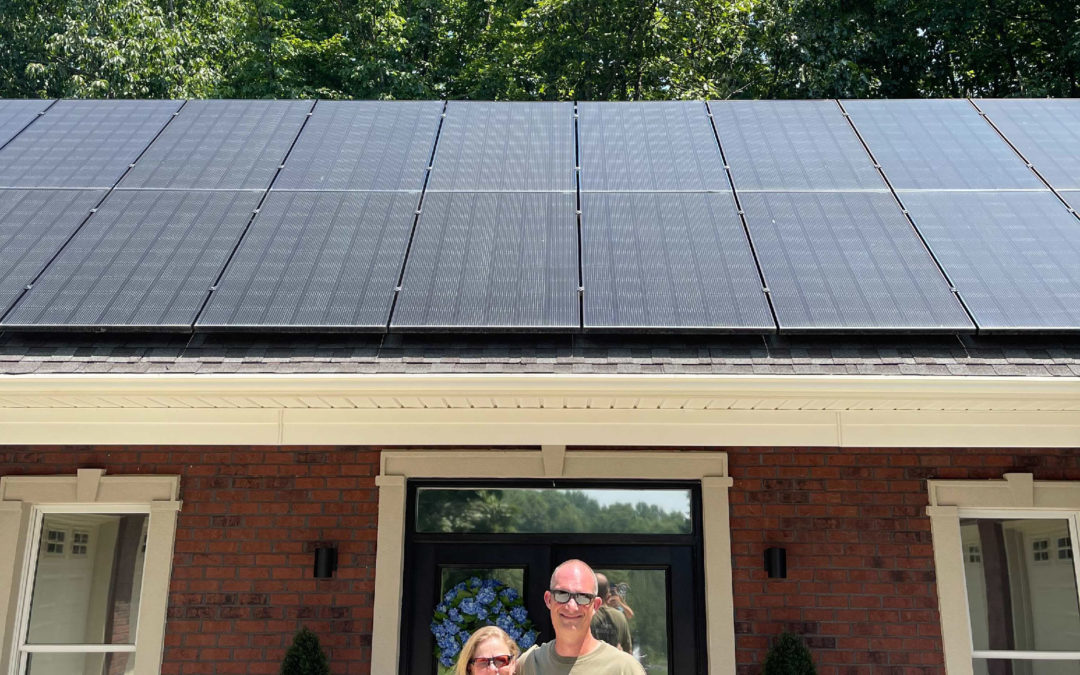
by Renu Energy | May 19, 2022 | Uncategorized
Net metering and Time of Use (TOU) are two different billing mechanisms used by utilities to compensate homeowners who generate their own electricity using solar panels.
Net metering allows homeowners to send excess electricity generated by their solar panels back to the grid, and receive credits on their utility bill for the electricity they’ve contributed. Essentially, the homeowner is only paying for net electricity used (i.e., the difference between the electricity generated and consumed).
Time of Use billing, on the other hand, is based on the time of day and the season when electricity is used. Electricity rates are higher during peak hours when demand is high and lower during off-peak hours when demand is low. With TOU billing, homeowners who generate their own electricity can choose to use it during peak hours when electricity rates are high, and sell excess electricity back to the grid during off-peak hours.
In summary, net metering is a simple way to compensate homeowners for the excess electricity they generate, while Time of Use billing allows homeowners to potentially save money by consuming or selling electricity during times when rates are favorable.In North Carolina and South Carolina, both net metering and Time of Use (TOU) billing are available options for homeowners who generate their own electricity using solar panels.
North Carolina has implemented net metering policies that allow homeowners to receive credits on their utility bill for the excess electricity generated by their solar panels and sent back to the grid. The credits are based on the retail rate for electricity and are applied to the homeowner’s next bill.
South Carolina also has net metering policies in place, with some utilities offering TOU billing as an alternative option. With TOU billing in South Carolina, homeowners can potentially save money by consuming or selling electricity during times when rates are lower.
It’s important to note that the specific policies and regulations regarding net metering and TOU billing in North Carolina and South Carolina can vary by utility, so it’s recommended to check with your local utility for more information





